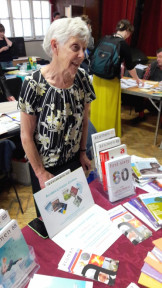Enduring appeal of print: long-running poetry magazines set out their stalls

Evidence of the staying power of print poetry magazines and some of its most respected and distinguished editors could be found in London on Saturday. Free Verse organisers Chrissy Williams and Joey Connolly, whose annual poetry book fair grows in popularity, returned to the fair’s Clerkenwell roots in launching an offshoot for magazines. It packed out the same church hall in Exmouth Market where the book fair started.
Print, you say? Surely that’s on the way out, with the growth of online poetry sites the way forward? But just as TV failed to destroy cinema and radio, it’s not as simple as that.


Subscriptions are the main way that most poetry magazines achieve sales. Alan Gillott, who with partner Rose Drew oversees Dream Catcher magazine, which is edited by John Gilham, emphasised the importance of subscribers in keeping poetry magazines going. “Magazines only exist because subscriptions make them happen,” he said. Subscriptions cover the cost of print runs: “No subscriptions, no magazine.”

The Rialto, which has founded in 1984, has a print run of 1,450 copies. Editor Michael Mackmin has noticed a big increase since he introduced a digital submissions process – one way in which online can work for print. These days he gets online submissions from almost 300 poets each month. The Rialto comes out three times a year, “at irregular intervals”, he said.
At the Magma stand, Susannah Hart, Cheryl Moskowitz and Lisa Kelly explained how every issue has a different editor, either board members or a prominent poet acting as guest editor. They look for a mix of well-known poets and newcomers, with each issue having a different theme, too.

Michael Schmidt’s PN Review, which began in 1972, can certainly be regarded as the heavyweight of poetry magazines. It comes out six times a year, and has a print run of 1,500, following a big increase in subscribers in the last couple of years, and a redesign. Other leading and long-running magazines represented at the fair included Agenda and Ambit - both began in 1959 - Poetry London, The North, Long Poem magazine, MPT (formerly Modern Poetry in Translation), and the Poetry Society’s Poetry Review.
There was also a group at the fair that seemed to have no connection with magazines. Poetry on the Picket Line, who were also seen later the same day at the Saboteur awards, where they had been shortlisted, offer their services to workers in dispute, and are keen to read on picket lines. “When you have a poet there, you get more press,” suggested Chip Grim. They may turn up, whether they have been invited or not.
Some poets may scorn them, but a CV of publishing credits in print magazines can often help in securing a book publishing deal, if you decide not to go down the self-publishing route. They are often lovingly produced, and do look nice on your bookshelf – something to treasure and cling onto, when some bloody hacker has cyber-wiped your online blogs?







Greg Freeman
Mon 15th May 2017 23:35
Thanks, Alan. Sorry to be a spoilsport but had to correct that typo!